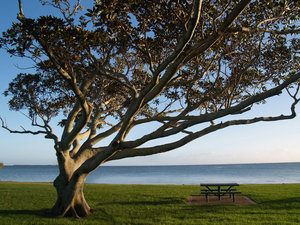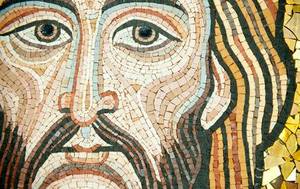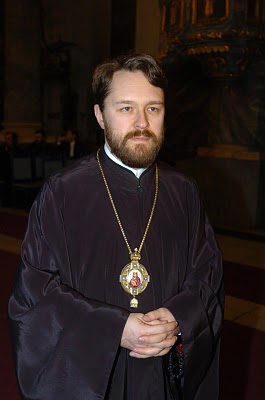Saint Hilary of Poitiers: “He who said ‘I have come not to do my own will but the will of him who sent me’ hastened to fulfill the task he had undertaken out of obedience, though in such a way as to remind us that he possessed a will of his own. In fact, he willed whatever the Father willed. His saying ‘I have come not to do my own will but the will of him who sent me’ revealed who had sent him and whom he obeyed, but without detriment to his own power of willing. Desiring to do everything the Father desired, Christ hastened to carry out his wishes with regard to his passion before the wicked could hinder him or prevent his doing so. He had a great longing to eat the Passover with his disciples, and he celebrated the paschal meal in haste. He had an intense desire to drink the cup of his passion, for he said: ‘Shall I not drink the cup which my Father has given me?’ When the search party came to arrest him and asked which man was Jesus, he stepped forward of his own accord. He asked for the sour wine which he knew he was destined to drink, and having drunk it and achieved his great purpose he said: ‘It is accomplished’, thus expressing his joy at obtaining his heart’s desire.”
Category: Theology
Cultivating Peace –the Benedictine way
You be interested in this video presentation, “Cultivating Peace in One’s Own Life and in Society” by Abbot James Wiseman of St Anselm’s Abbey (Washington, DC).
PAX!
Hanging Concentrates the Mind
Be sure to have enough sleep and at least have eaten one meal today before you read and give some serious consideration to what Father George Rutler, pastor of the Church of Our Saviour (NYC) has to say about the death penalty. A recent essay was published today in Crisis Magazine online.
MOST Catholics, the informed and untrained, have no idea what the Church teaches about the subject. Many will recall that Pope John Paul II taught in Evangelium vitae (1995) and that he frequently spoke against the death penalty and it was the subject of intervention when he would visit a country where the death penalty was utilized (think of his visit to Missouri). A papal encyclical doesn’t change the teaching of the Church; it is however authoritative and it needs to be received. The matter of what level teaching an encyclical is, and to what degree it would bind conscience. For our purposes here, let’s say that a papal encyclical is authoritative and it involves the virtue of prudence but that it doesn’t contravene but it does nuance the teaching of the Church. Prudential judgment is just that, prudential. The Pope never changed the teaching of the Church. The blessed pope did try to reorient our thinking and the practice of killing legitimately convicted criminals. Remember, too, several years the heated debated between Cardinal Avery Dulles and Justice Scalia on the subject in First Things?
Father Rutler’s article is helpful in giving us yet another understanding of how we might understand the death penalty. Do we actually accept Christian belief in the salvation of one’s soul, that is, do we want to go to heaven? Read the article with openness, with a critical mind. As Saint Ignatius would teach, approach with the best of intentions to truly understand the other person. Knee jerk reactions are unacceptable for a Catholic who holds the integration of faith and reason. Father Rutler’s argument is Catholic on all levels.
The article…
Capital punishment does not inspire roaring humor in healthy minds, so wit on the subject tends to be sardonic. Two of the most famous examples, of course, are: “In this country it is wise to kill an admiral from time to time to encourage the others,” and “Depend upon it, sir, when a man knows he is to be hanged in a fortnight, it concentrates his mind wonderfully.”
The first, “pour encourager les autres,” is in “Candide” where Voltaire alludes to the death by firing squad of Admiral John Byng in 1757 for having let Mincorca fall to the French. The second was Samuel Johnson’s response to the hanging of an Anglican clergyman and royal chaplain William Dodd for a loan scam. Byng’s death was the last instance of shooting an officer for incompetence, while Dodd’s was the last hanging at Tyburn for forgery. Dodd’s unsuccessful appeal for clemency was ghostwritten by Dr. Johnson.
Treachery to the truth today?
Theologians are after divine truth and not mere human opinions. There is a danger and a difficulty about this point. We are in danger of modern disregard of theology. . . . The danger nowadays is overemphasis on non-intellectual elements. This means a kind of treachery to the truth. It used to be assumed that man is a reasonable animal. The modern idea seems to be that man is first and foremost a creature with a heart. I am not prepared, however, to give up my reason in connection with the things of God.
Father Georges Florovsky
Remarks made at the Second World Conference on Faith and Order
Edinburgh, August 4, 1937
Is Father Florovsky correct in his perception? I tend to think so….
Catholics and Orthodox need to preserve the good of the dialogue for unity
Back on 31 October 2012, Russian Orthodox Metropolitan Hilarion Alfeyev of Volokolamsk
delivered a lecture dedicated to the past and present of Orthodox-Catholic dialogue at Villanova University (Philadelphia, PA). The 46 year old Metropolitan earned a doctorate from Oxford University and was ordained a bishop in 2002. In addition to being a residential bishop he is also the head of the Department of the External Church Relations since 2009. He is a widely published author and an excellent musician of international repute. The two Churches share the same concerns, though there are nuances to be made but that is a conversation for another time.
I think it is apropos to give a few extracts from the Metropolitan’s talk that pose some points for reflection on the unity of Christians. Remember we beginning the octave of Christian Unity on the 18th.
“The teaching of the holy fathers of the first millennium, when the Churches of the East and the West abided in unity, although at times this unity was subjected to serious trials, is the sure foundation upon which dialogue between Christians can develop successfully and fruitfully. It is my profound conviction that fidelity to the Christian tradition, the preservation of continuity in the teaching and life of the Church is the proper means for the restoration of unity among Christ’s disciples.
Continue reading Catholics and Orthodox need to preserve the good of the dialogue for unity
Christians lack nothing with Christ
The attribution to the following is given to Saint John Chrysostom but the citation has not been found, but the Pope quoted the saint in a recent Wednesday Audience. It’s a striking reflection for our spiritual life, it even can be used for our daily examen. The saint said,
do you lack? You have become immortal, you have become free, you have become a
son, you have become righteous, you have become a brother, you have become a
joint heir, with Christ you reign, with Christ you are glorified. Everything is
given to us, and – as it is written – ‘can we not expect that with him he will
freely give us all his gifts?'(Rom 8:32). Your first fruits (cf. 1 Cor
15:20.23) are adored by angels […]: what do you lack?
Schools of Theology: A 2012 Review
First Things editor RR Reno published his “A 2012 Ranking of Graduate Programs in Theology” yesterday, the annual romp through what’s out there for theological formation. A somewhat helpful review but it doesn’t really cover some important data. Nevertheless, it is good to see a review that advances a good perspective. What is that perspective? In my humble opinion: that in all things God may be glorified AND thinking with the Church.
- The five areas a good school of theology needs to be attentive to: sacred Scripture, sacred Liturgy, patristic study, dogmatic study and ethics. I fully believe that Prosper of Aquataine is correct, and ought to orient all study of theology: legem credendi lex statuat supplicandi. In shorthand, the law of prayer is the law of belief.
The end times are indeed near at hand…
The end times are indeed near at hand. That is not to say that the “12/12/2012” Mayan prediction of the end of the world is true –it is not– or that the rapture approach is insightful. But if you really believe that Jesus Christ is Lord and Savior then an acknowledgement of our living in the end times is the right way to live. The Scripture readings in these final weeks of the liturgical year, but especially this week, prepare the believer to face the fact of the final things, sometimes called the Four Last Things: death, judgement, heaven, and hell. We can’t get away from these things. If we could, then there would be no need of a Messiah, of the Cross and Resurrection, the Eucharist, the sacraments, the Church, and a spiritual life; no need for salvation. If there is no probability of hell, then there is no need of salvation.
- heaven “is not an abstraction nor a physical place amid the clouds, but a living and personal relationship with the Holy Trinity;
- When this world has passed away, those who accepted God in their lives and were sincerely open to his love, at least at the moment of death, will enjoy that fullness of communion with God, which is the goal of human existence”;
- the hell some will enjoy is not the result of God willing the death of the person but the result of the person not desiring the love and mercy God has offered, that he has freely given;
- the Pope spoke of the danger of rigidly holding a literal interpretation of the Scriptural images of hell: for John Paul, and therefore us, “the inextinguishable fire” and “burning oven” in the biblical narrative points the hearer to “indicate the complete frustration and vacuity of a life without God”;
- we know that hell exists; we don’t know the population of hell; Cf. Cardinal Avery Dulles’ famous First Things article, “The Population of Hell”; John Paul says that hell is not something that we can know but that real damnation “remains a possibility”;
- On purgatory the Pope said, is the state of being “before we enter into God’s kingdom, every trace of sin within us must be eliminated, every imperfection in our soul must be corrected. This is exactly what takes place in purgatory”;
- Purgatory is “the process of purification for those who die in the love of God but are not completely imbued with that love”;
- even though Christ holds His hand in friendship, that is, in love, the extension of our hand “does not exclude they duty to present ourselves pure and whole before God.”
- Read the Catechism at paragraph 1861.
So how can we honestly and proactively approach today’s feast, and this holiday season in a way that will get us past the public façade of wise-guy banter and beyond the disconnect between hard realities and sincere beliefs and honest ideals? How might we bravely allow our deeper humanity to shine forth in the midst of some extreme assaults on such things as tenderness, hope, and compassion?
Today’s readings, along with monastic wisdom and psychological insight suggest the following: Daily if not hourly slow down the frantic pace of our media interaction, verbosity, and endless tasks: daily if not hourly return to the temple of our own person and the holy and fertile ground of our interior life. Daily if not continually express appreciation for whatever someone does that makes my life richer today: Daily or at least once in a while do something simple but concrete and different, for the express purpose of nurturing the human spirit, within yourself, for someone else, and for the future.
In these days in the post Christ the King observance and before Advent, let’s pray for the grace to know ourselves more deeply so as to accept more fully “divine work” in our lives with the gift of discernment showing us the way to the Father.
3 unavoidable questions for Christian faith’s reasonability
In recent years, we have seen a significant interest in teaching the faith more authentically, but also we’ve become more attentive to answering the real questions believers and unbelievers have. With the Year of Faith fully engaged now, I think we need to attend to three unavoidable questions whether we are teaching teens, adults, or expanding the horizons of our faith and understanding of the cosmos we live in.
Continue reading 3 unavoidable questions for Christian faith’s reasonability
When Fig Leaves Sprout
 My neighbor has several fig trees. His children are now in the process of wrapping them up for the winter –New England is not an agreeable place to raise fig trees all year.
My neighbor has several fig trees. His children are now in the process of wrapping them up for the winter –New England is not an agreeable place to raise fig trees all year.Based on today’s Scripture readings, the poem “When Fig Leaves Sprout” by Minnesota composer William Beckstrand captures the sense of what we are about in the Christian life.
once for all
life
pleads for us at God’s right hand,
coming stern and grand.




